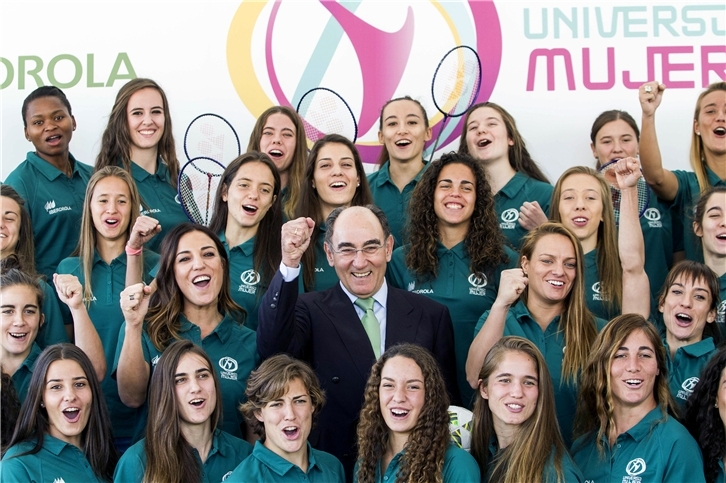News
-
23/11/2017Ignacio Galán reaffirms Iberdrola’s commitment to the environment Iberdrola Chairman, Ignacio Galán, has reaffirmed the company’s commitment to fighting climate change , sustainable development and the environment at a meeting in Madrid with Spain’s Minister for Energy, Tourism and Digital Agenda, Álvaro Nadal, and the heads of the regional governments of Castile-Leon, Juan Vicente Herrera, and Asturias, Javier Fernández. In this regard, Galán defended the consistency of Iberdrola’s decision of phasing out all of its coal-fired power producing capacity worldwide, an energy source which represents just 1.8% of the group’s total installed capacity of 48,062 megawatts (MW), with the strategic decision made by its governing board to fight against climate change. On 10th November, the company filed a permit application with the Ministry of Energy, Tourism and Digital Strategy to close the coal-fired power plants in Lada (Asturias) and Velilla (Palencia). With a combined capacity of 874 MW, both assets are located in Spain and in 2016 accounted for less than 1% of the country’s total power output. Since 2001, the company has decommissioned nearly 7,500 MW of thermal power capacity (see chart below) across the globe. In 2013 and 2016, Cockenzie and Longannet, two large power plants in the United Kingdom with a combined capacity of 3,600 MW, were closed. Also, between 2001 and 2012 over 3,200 MW of fuel-oil-fired plants were phased out in Spain. Meanwhile, it has commissioned renewables and environmentally friendly assets amounting to 34,000 MW. Closure of the two plants will affect neither security of supply nor energy prices (since their combined production represents less than 1% of Spain’s total) nor the company’s strong long-term commitment to job stability since 100% of the staff will be relocated. Instead the decision will produce environmental benefits for densely populated urban areas. During the meeting, Ignacio Galán shared some figures to highlight the group’s internationally recognised environmental commitment: Iberdrola is a global leader in renewable energies with 28,800 MW installed: * € 30 billion invested in renewables up to 2016 and another €9 billion planned by 2020. * World leader in wind energy (16 GW): number 1 in Europe, Spain and UK; number 3 in USA. * Driving offshore wind technology: by 2022 it will have installed 1,750 MW in Europe with a project pipeline of over 8 GW for the next decade in Europe and the United States. * 4,5 GW pumped hydroelectric capacity in operation and construction. Furthermore, Ignacio Galán reiterated that Iberdrola, together with other leading European Energy companies, recently called upon the European Commission and Parliament to embrace higher and more ambitious binding renewable energy targets for 2030 by raising the share of renewables in the final energy demand on the continent from the current target of 27% to 35%. Iberdrola is one of the world’s electric utilities with the lowest CO2 emissions: * Since the year 2000, it has reduced by 75% its emissions in Europe * CO2 emissions/MWh ratio is already 67% lower than peer average in Continental Europe. * Maintains its commitment to reduce its CO2 emissions intensity by 50% in 2030 and become carbon neutral in 2050. * 66% of its installed capacity is emissions free. Also, Ignacio Galán stated that Iberdrola is fully aligned with the environmental targets set by the Paris Agreement, having played an active role at the climate summits in Paris (COP21), Marrakech (COP22) and Bonn (COP23) while at the same time having incorporated to its business strategy and sustainability policy the Sustainable Development Goals (SDG) as defined by the UN for the 2015-2030 period. The company has become a benchmark in global sustainability indices - DJSI, Global 100 Most Sustainable Corporations in the World, Carbon Disclosure Project- and is a global leader in ethical finance after placing €6.7 billion in nine green bond issuances and receiving a €500 million green loan. Iberdrola pioneered the integration of combatting global warming as a priority into its corporate governance system. In 2009 it approved its Policy against Climate Change undertaking, among other measures, to support an ambitious global emissions reduction target; to promote the development of efficient technologies to bring down greenhouse-gas emissions; to advocate for an integrated and fair global emissions market while fostering the efficient and responsible use of energy involving all company stakeholders. This commitment has been incorporated to the company’s by-laws as part of the social dividend as well as to the Mission, Vision and Values of Iberdrola Group. THERMAL POWER PLANTS CLOSED BY IBERDROLA SINCE 2001 PLANT TECHNOLOGY Capacity (MW) Closed in Escombreras 1, 2 y 3 Fuel oil 300 2001 Castellón 1 y 2 Fuel oil 1.000 2008 Aceca 2 Fuel oil 314 2009 Santurce 1 y 2 Fuel oil 1.000 2009 Escombreras 4 y 5 Fuel oil 574 2010 Cockenzie Coal 1.200 2012 Pasajes Coal 217 2012 Lada 3 Coal 150 2012 Aceca 1 Fuel oil 314 2012 Longannet Coal 2.400 2016 READ MORE
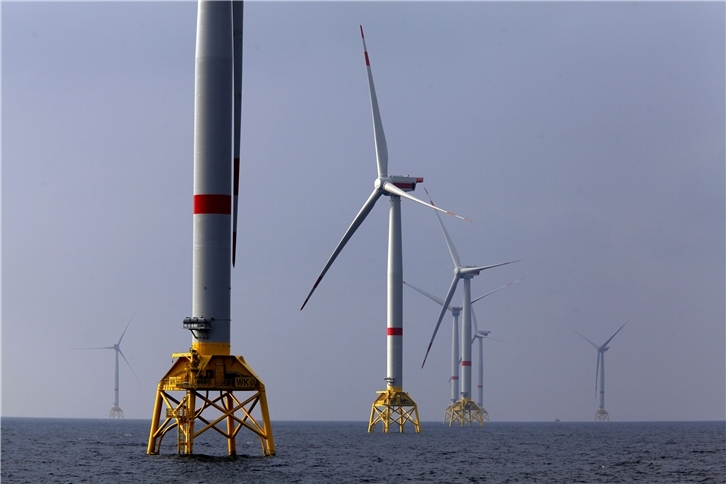
-
15/11/2017Trama Tecnoambiental, Instituto Nacional de Eficiencia Energética y Energías Renovables (Ecuador) and Nexus for Development, winners of IBERDROLA’s II International Energy Cooperation Awards Iberdrola and Club de Excelencia en Sostenibilidad, with the collaboration of the Spanish Ministry of Foreign Affairs and Cooperation, announced the winners of the second edition of Iberdrola’s International Energy Cooperation Awards at an event held at the company’s offices in Madrid. In this new call, Trama TecnoAmbiental, was proclaimed as winner of the Enterprise category; the Instituto Nacional de Eficiencia Energética y Energías Renovables de Ecuador (INER), in the Public Administration category; and Nexus for Development, in the Not-for-Profit and Non-Governmental Organisations category. Spanish Ministry of Foreign Affairs and Cooperation, Alfonso Dastis, presented the awards to the winners. He was joined by the Chairman of Iberdrola Ignacio Galán and the President of Club de Excelencia en Sostenibilidad, Ramón Paredes. During his speech, Mr. Galán stated that “we have the ability – and I would even dare to say, responsibility – to accelerate the development of the most disadvantageous communities and guarantee them access to affordable, reliable and safe energy. To comply, in short, with the purpose of achieving the objectives of the Sustainable Development Goals, signed at the 2005 Heads of State Summit. This is a shared responsibility that without a doubt, can be better fulfilled through public-private partnerships”. In addition, Iberdrola’s Chairman recalled his firm belief that “together we can provide the best solutions to respond to the energy, social and environmental challenges we face and achieve a more sustainable world”. Ramón Paredes underlined the importance that both participating entities and members of Club de Excelencia en Sostenibilidad have, in relation with promoting energy universalization initiatives and the opportunity that it entails in the current context to contribute to the Sustainable Development Goals (SDG) set by the United Nations (UN) for the 2030 horizon. In particular, ensuring universal access to affordable, reliable and modern energy services corresponds to the first target of the SDG 7 as well as the initiative behind the celebration of the second edition of this international energetic cooperation awards. Iberdrola’s II International Energy Cooperation Awards aim to recognize the best initiatives carried out by companies, the public sector and the third sector in the field of international cooperation. Winning Initiatives The Jury recognized in the Enterprise category the work of Trama TecnoAmbiental, whose “Rural electrification through hybrid solar microgrids in remote islands of Ghana” project executed the engineering, construction and operation of five microgrids with hybrid photovoltaic generation in four Ghanaian towns under the GEDAP Project (Ghana Energy Development and Access Project). The fraction of hybrid renewable energy is 100%, with a total installed capacity of 189 kilowatts peak (kWp). Its vision is to act globally for the development of microgrids based on renewable energies aiming to contribute to the access to electricity in rural and isolated areas. Consequently, being able to contribute to the reduction of poverty and the protection of the environment, allowing to promote education and improve other basic services such as health. The winner of the Public Administration category was INER from Ecuador for their Study of the viability of bioethanol production from the enzymatic hydrolysis of the seed shell of Jatropha Curcas known as physic nut. The use of this biofuel not only contributes to the reduction of greenhouse gases, but also can become a sustainable source of income for farmers in the area. Nexus for Development has been the third award-winning entity as a non-profit organization for their Pioneer Facility project, which provides technical assistance and innovative financial solutions for project developers and social enterprises with the creation of a specific impact investment fund – Pioneer Facility – aiming to create access to clean energy in Southeast Asia. This project has already raised 2,2 million dollars of investment, demonstrating how it has acted as a lever for change for sustainable growth and sustainable energy. Particularly, thanks to its unique combination of financing, cooperation from local actors and the monitorization of the impact. About Iberdrola Iberdrola is a world leader in wind energy and one of the largest electric companies in the world with a recognized commitment to sustainable development. The company is aware of the crucial role it can play regarding the universalization of essential services, particularly, those linked to energy in regions where a significant part of the population still does not have access to modern forms of energy. Iberdrola has already aligned its strategy with the Sustainable Development Goals (SDG) established by the United Nations (UN) in 2015. Both SDG 7 and 13, “Affordable and clean energy” and “Climate Action” are the main areas at which Iberdrola focuses its efforts, without diminishing the direct and indirect contribution to the rest of the objectives. The 'Electricity for all' program is Iberdrola's response to the call made by the international community to extend universal access to modern forms of energy, with environmentally sustainable, economically acceptable and socially inclusive models. Its purpose is to ensure access to electricity in emerging and developing countries. This ambitious initiative focuses on carrying out sustainable electrification actions, for which the company will take advantage of its technical, logistical, organizational and financial capacity. About Club de Excelencia en Sostenibilidad Club de Excelencia en Sostenibilidad is a business association formed by a group of major corporations that are committed to achieving sustainable development in economic, social and environmental terms. It is the leading forum in Spain for publishing and promoting responsible practices. The members of Club de Excelencia en Sostenibilidad are: ABB Spain, Adecco Spain, AENA, Grupo Antolín, BASF Spain, BSH Electrodomésticos Spain, CEMEX Spain, Endesa, FCC, Mahou San Miguel, Iberdrola, ISS Facility Services, Orange Spain, Red Eléctrica de España, Renault Spain, Saint-Gobain Placo, SEAT and Vodafone Spain. READ MORE
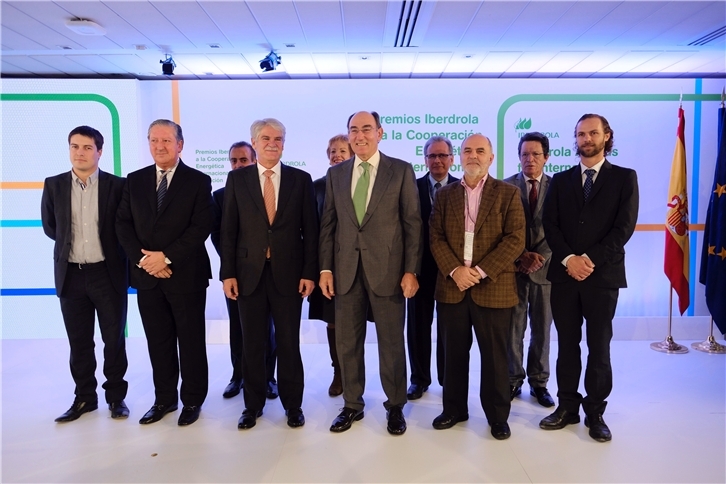
-
14/11/2017Iberdrola launches the Spanish 'green' hybrid bond market with an issuance of €1 billion Iberdrola has successfully placed its first issue of green hybrid bonds on the Euromarket, valued at €1 billion. The proceeds obtained from it will be used to refinance investments in different renewable projects in the United Kingdom. The issuance has fixed the coupon at 1.875%, lowering the reference rate with which it initially went to the market. The good conditions obtained are supported by strong demand from investors, with demand exceeding supply by 3.3 times, offering green investors a product that is rarely found on the market. The issue was placed among qualified investors by Banco Bilbao Vizcaya Argentaria, SA, Barclays, BNP Paribas, Credit Agricole CIB, HSBC, ING Bank NV, JP Morgan, MUFG, Santander and Unicredit Bank AG. Iberdrola will have the option to buy back the new hybrid bond at the same rate within five and a half years, and subsequently with an annual frequency coinciding with the interest payment date. The hybrid bonds will be half-debt and half-capital, in accordance with the methodology used by the main rating agencies. This issuance of hybrid bonds that are rated as green is the first of its kind carried out by a Spanish company, and the second internationally. It guarantees that the funds obtained will be used to finance sustainable and socially responsible projects, a use that is validated by the independent agency Vigeo Eiris . With this transaction, Iberdrola continues making progress in its strategy to ensure that a large part of its liabilities have a green format, in accordance with the company's commitment to a low-carbon energy mix. The Group was the world’s largest corporate green issuer in the 2016 financial year and has continued to carry out all of its public operations in this format in the current financial year. In addition, Iberdrola signed the world's first green loan to be raised by an energy company. The loan was agreed with BBVA at the end of 2016 and has a total value of €500 million. The company has thus become an international benchmark in this type of financing. Iberdrola has incorporated the United Nations' Sustainable Development Goals (SDGs) into its corporate strategy. The projects to which the resources obtained will be allocated are aligned with the following goals: Number 7 - Affordable and Non-Polluting Energy and Number 13 - Climate Action. READ MORE
-
13/11/2017Iberdrola Urges Industry to Take Action on Climate Change Speaking at the COP23 summit in Bonn, Iberdrola’s Chairman Ignacio Galan has called on governments, corporations from all sectors of the economy and other actors across the world to take firm action on combating climate change. “Time for talking has passed, it´s time for action now!” he added. “The path towards a sustainable and competitive decarbonised economy is not a problem, but a unique opportunity that creates value for society as a whole”, Galán said. However, “This transition needs continued efforts and shared responsibility. Both companies and governments have to work together more than ever, to develop stable frameworks, technologies and skills in order to drive the world towards a cleaner, more sustainable, efficient and economically viable energy future”. Citing Iberdrola's decision to close their remaining coal power plants in Spain, Ignacio Galan said: "Iberdrola has set very strong targets to reduce carbon emissions, meaning we will reduce our carbon intensity by 50% in 2030. In this sense, we have made the tough decision to close all of our fuel oil and coal-fired power plants around the world (almost 7,500 MW), and focus on renewable technologies -which are essential for the electrification of the economy (especially in transport)-, as well as on the required network infrastructures and storage capacity to ensure supply. “Iberdrola will continue to do our part, but we need other industries and companies to follow our lead”. READ MORE
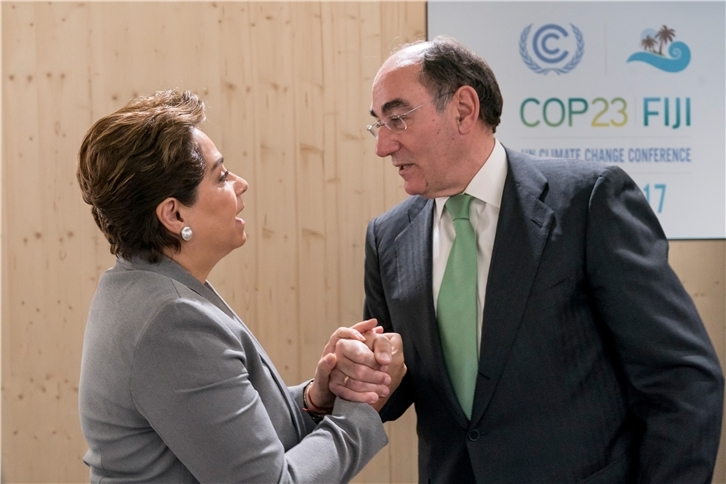
-
10/11/2017Ignacio Galán, Chairman of Iberdrola, attended the ceremony in which Manuel Marín and Jean Claude Juncker received an honorary doctorate from Salamanca University (USAL) Ignacio Galán, Chairman of Iberdrola, attended the ceremony in which Manuel Marín and Jean Claude Juncker received an honorary doctorate from Salamanca University (USAL) During his speech at the Main Hall of the USAL, the President of the European Commission, Jean Claude Juncker, stated that "we do not have the right to dissolve a national and regional coexistence model we have built together. If we do this, we will start to go adrift". Manuel Marín, former commissioner of Social Affairs and current President of Fundación Iberdrola Spain, also received an honorary doctorate from Salamanca University (USAL), although he could not attend the ceremony for personal reasons. READ MORE
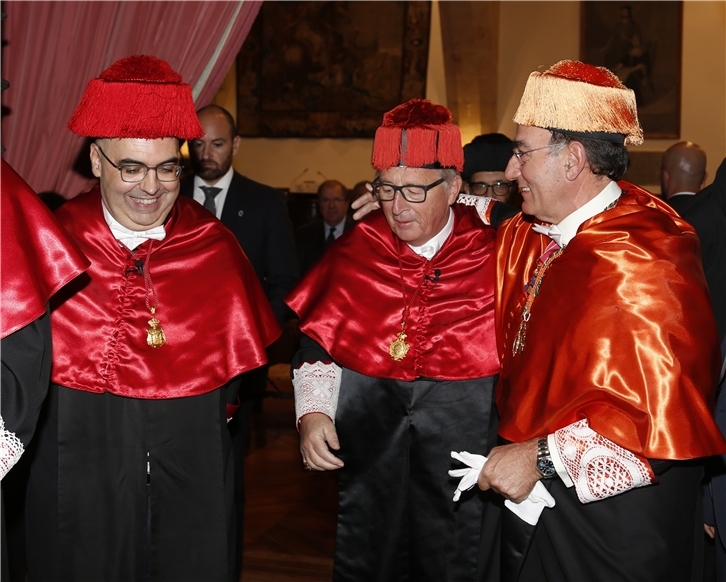
-
10/11/2017Iberdrola announces the complete closure of its coal-fired power capacity In line with its strong commitment to tackling the effects of climate change, Iberdrola has decided to complete the process of phasing out all its coal-fired power generation capacity worldwide. The technology represents 1.8% of the group’s total installed capacity of 48,062 megawatts (MW) and 1.5% of its electricity production for the first nine months of the year (1,596 GWh out of 102,494 GWh). To this end, the company has filed a permit application with the Ministry of Energy, Tourism and Digital Strategy to close the coal-fired power plants in Lada (Asturias) and Velilla (Palencia). Both of the assets are situated in Spain and represent a combined capacity 874 MW. With this decision the company ratifies its commitment to reduce its CO2 emissions intensity by 50% in 2030 and become carbon neutral in 2050. Iberdrola group operates 28,778 MW clean capacity through renewable energy generation sources, mainly onshore and offshore wind (15,902 MW) and hydroelectric power (12,756 MW). Last week, Iberdrola, together with other leading Energy companies, called upon European policy makers to embrace higher and more ambitious binding renewable energy targets for 2030 by raising the share of renewables in the final energy demand on the continent from the current target of 27% to 35%. Once the remaining coal-fired plants are closed the company’s emissions-free capacity will stand at 68%. This figure rises to 76% in Spain, where the security of supply will not be impacted by this initiative thanks to the 5,695 MW back-up capacity in combined gas cycles the company operates. Closure of the plants will not impact the company’s strong commitment to job stability since all the affected employees (90 at Lada and 80 at Velilla) will either be relocated to other facilities or will be engaged in their respective decommissioning process which will last for four years after approval of the closure by the Ministry of Energy, with an investment of €35 million. Since 2001, the company has phased out 7,500 MW of thermal power capacity (see chart below) worldwide. In 2013 and 2016, Cockenzie and Longannet, two large power plants in the United Kingdom with a combined capacity of 3,600 MW, were closed. Also, between 2001 and 2012 over 3,200 MW of fuel-oil-fired plants were decommissioned in Spain. Thanks to the progressive decarbonisation of its electricity generation mix, over the past 15 years Iberdrola has become a reference point in the global fight against climate change, having invested €90 billion in the process. Today, it has become a global leader in onshore wind while bringing down emissions to 70% below its European peers, representing an improvement of 75% since the year 2000. Commitment to fighting climate change In 2009, Iberdrola approved its Policy to Fight Climate Change undertaking, among other measures, to support an ambitious global emissions reduction target; to promote the development of efficient technologies to bring down greenhouse-gas emissions; to advocate for an integrated and fair global emissions market while fostering the efficient and responsible use of energy involving all company stakeholders. Also, and in order to reduce emissions, it is essential for Iberdrola that a strong signal on CO2 prices is given to markets, affecting all sectors of the economy. In addition, the company understands that with the right climate policies the fight to mitigate emissions and adapt to global warming are opportunities for economic growth. Lastly, the company has been working as a key partner with the United Nations Framework Convention on Climate Change and has an active presence at COP23 which takes place in Bonn until 17 November. Thermal power plants closed by Iberdrola since 2001 Plant Tech. Power (MW) Closing year Escombreras 1, 2 y 3 Fuel oil 300 2001 Castellón 1 y 2 Fuel oil 1.000 2008 Aceca 2 Fuel oil 314 2009 Santurce 1 y 2 Fuel oil 1.000 2009 Escombreras 4 y 5 Fuel oil 574 2010 Cockenzie Carbón 1.200 2012 Pasajes Carbón 217 2012 Lada 3 Carbón 150 2012 Aceca 1 Fuel oil 314 2012 Longannet Carbón 2.400 2016 READ MORE
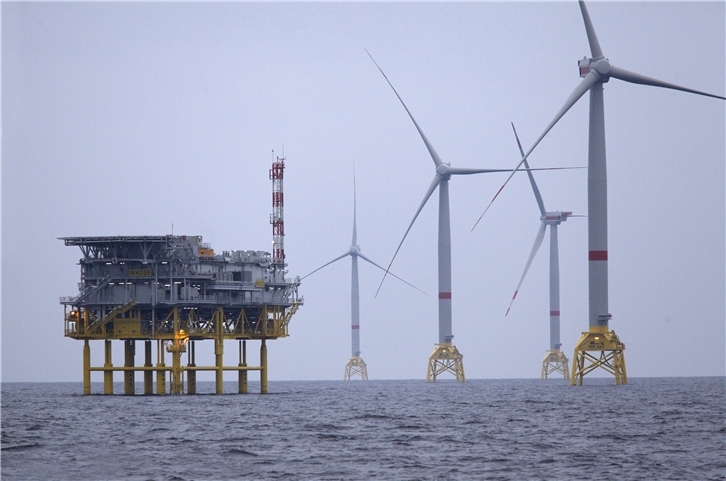
-
07/11/2017Net profit reaches €2.41 billion (+18.4%) thanks to international businesses which compensate poor results in Spain In the first nine months of 2017, Iberdrola carried out investments worth €3.99 billion, up by 31.5% from the same period last year. Of that amount, 91% was allocated to networks, renewable energy and long-term contracted generation projects, consistent with the group’s strategy of focusing activity and future returns on stable and regulated businesses. In this sense, Iberdrola is currently building 7,361 megawatts (MW) capacity, to be commissioned by 2020, of which 2,700 MW will be operational in 2018. These new facilities will be, for the most part, offshore and onshore wind farms (1,064 MW and 1,412 MW respectively) as well as combined cycles and co-generation plants (3,571 MW). To deliver this growth process, Iberdrola hired 2,559 new employees, bringing total staff to 34,400 people at the end of September. Also, the group made purchases worth over €6.3 billion to more than 20,000 suppliers. The company’s net profit reached €2.41 billion between January and September, an 18.4% increase from the same period last year. These good results reflect positive performance in the networks and long-term contracted generation businesses as well as the company’s international diversification, with subsidiaries in the US (AVANGRID) and Brazil (Neoenergia) making important contributions. AVANGRID’s net profit reached $494 million for the first nine months of 2017 (+14%) and the subsidiary is already offering total shareholder return above 38% so far this year. Additionally, the company reorganisation in Brazil (the integration of Elektro in Neoenergia) entails capital gains of €521 million as a result of the listing at market value of the stake that Iberdrola used to have in Neoenergia, which now stands at 52.45%. As a consequence, the Brazilian subsidiary has a net positive impact of €508 million in the group’s earnings for the first nine months of the year. Ebitda stood at €5.44 billion, 5.1% below the same period last year, impacted by lower hydroelectric power production in Spain (-57.2%), and lower demand and margins in the UK’s liberalized market. Nevertheless, the good performance in the networks area where Ebitda grew by 5.4%, and contracted generation in Mexico, up by 26.7%, continued to contribute positively to results. Meanwhile, Renewables remained stable. Revenues between January and September stood at €22.28 billion, up by 3.5% with the gross margin rising 0.2% to €9.76 billion. Operating cash flow reached €4.62 billion, a drop of 1.9%, while taxes and levies were €1.46 billion (+12.4%). Results by business Good performance in the networks, contracted generation and renewables areas have partially offset poor performance in Spain, due to lower hydro output, and in the UK’s liberalised area. By business, networks Ebitda grew 5.4% to €3.09 billion, driven by positive operating performance in the US and Brazil which improved by 15.8% and 72.4% respectively. Account has to be taken of Neoenergia consolidation as well as the fact that over 60% of the networks Ebitda originates outside Spain. Generation and supply recorded Ebitda of €1.24 billion until September, (-28.4%). These results were affected by the extremely low hydroelectric power production in Spain (-57.6%) and the weak results in the United Kingdom, mainly due to reduced production (-28.6%) after the closure of Longannet coal-fired plant, plus lower demand and lower margins. Renewables was stable with €1.14 billion Ebitda, in line with the first nine months of 2016. Although Spain was also affected by low wind resource, results improved elsewhere, growing in the UK (+34.7%) as well as Brazil and Mexico (+3%). In addition, the United States is now the country with the largest contribution to renewables earnings, with 36% of the total. Shareholder remuneration increased + 3,7% Derived from the confidence in the group’s structural strength and in line with its pledge, the Board of Directors has approved a new edition of the Iberdrola Flexible Dividend programme for the interim dividend payable in January 2018. This new edition includes a novelty: shareholders will have the choice of receiving the dividend in cash in addition to the usual options available to shareholders of receiving dividend as new company shares free of charge, selling their free allocation rights on the market or selling them to the company at a fixed guaranteed price. Shareholders opting to receive remuneration in cash will get, at least, €0.14 gross per share, a 3.7% increase from the amount committed for the Iberdrola Flexible Dividend programme paid in January 2017. The option of selling allocation rights to Iberdrola is expected to be fully replaced by a cash payment in July 2018, in the framework of the final dividend against 2017 earnings. This proposal will be presented for approval at the next General Shareholders’ Meeting. 2017 results outlook As reflected by the group’s Ebitda, the first nine months of the year have been impacted by an inferior operating performance as a result of lower production, mainly hydroelectric power generation in Spain. However, the company’s core businesses continue to show good performance as the results in networks, contracted generation and renewables reveal. Therefore, Iberdrola is confident that 2017 net profit will continue delivering growth. READ MORE
-
06/11/2017Premios Nacionales del Deporte: Iberdrola, galardonada con la Copa Stadium Hoy se han fallado en el Consejo Superior de Deportes los Premios Nacionales del Deporte correspondientes al año 2016 que, convocados con carácter anual por el CSD, tienen como objeto distinguir a aquellas personas y entidades que, bien por su directa actividad o iniciativa personal, bien como partícipes en el desarrollo de la política deportiva, han contribuido en forma destacada a impulsar o difundir la actividad físico-deportiva. José Ramón Lete, tras conocer el resultado de las deliberaciones, ha agradecido la colaboración de todos los miembros del jurado que, presidido por Jaime González Castaño, Director General de Deportes del CSD, está compuesto por diferentes representantes del CSD, COE, Federaciones Deportivas, comunidades autónomas, corporaciones locales, medios de comunicación y deportistas de reconocido prestigio. El fallo del jurado ha sido el siguiente: Premio Rey Felipe: Para premiar al deportista español que más se haya distinguido durante el año en su actuación deportiva, tanto a nivel nacional como internacional. Premiado: Saúl Craviotto (Piragüismo) Premio Reina Letizia: Para premiar a la deportista española que más se haya distinguido durante el año en su actuación deportiva, tanto a nivel nacional como internacional. Premiadas ex aequo: Lidya Valentín (halterofilia) y Maialen Chourraut (piragüismo) Premio Rey Juan Carlos: Para premiar al deportista masculino o femenino que por los resultados obtenidos durante el año haya supuesto la revelación más significativa del panorama deportivo. Premiado: Marcus Cooper (piragüismo) Premio Reina Sofía: Para premiar a la persona o entidad que más haya destacado durante el año por un gesto especialmente relevante de nobleza o juego limpio en la práctica deportiva, o que haya prestado una contribución especial a la erradicación de la violencia en el deporte. Premiada: Laura Sarosi (bádminton) Premio Princesa Leonor: Para premiar al/la deportista, menor de 18 años, que más haya destacado durante el año, por su progresión deportiva. Premiado: Hugo González (natación) Premio Infanta Sofía: Para premiar a la persona o entidad que por su propia actuación deportiva o por el fomento de la actividad de otros haya destacado especialmente en la difusión y mejora de la actividad deportiva entre los discapacitados físicos, psíquicos o sensoriales. Premiada: Teresa Perales (natación) Trofeo Comunidad Iberoamericana: Para premiar al deportista iberoamericano que más haya destacado durante el año en sus actividades deportivas internacionales. Premiado: Santiago Lange y Cecilia Carranza (vela) Copa Barón de Güell: Para premiar a equipos o selecciones nacionales que más hayan destacado por su actuación deportiva durante el año. Premiados ex aequo: Equipo olímpico español de piragüismo Copa Stadium: Para premiar a la persona o entidad que haya destacado por su especial contribución durante el año a tareas de promoción y fomento del deporte. Premiado: Iberdrola Premio Consejo Superior de Deportes: Para premiar a la entidad local española que más haya destacado durante el año por sus iniciativas para el fomento del deporte, sea en la promoción y organización de actividades, sea en la dotación de instalaciones deportivas. Premiado: Ayuntamiento de Antequera Trofeo Joaquín Blume: Para premiar a la Universidad o centro escolar que se haya distinguido especialmente durante el año por su labor de promoción y fomento del deporte. Premiado: CEIP Ferroviario Ciudad Real Premio Nacional a las Artes y las Ciencias Aplicadas al Deporte: Para premiar al profesional que en el ejercicio de su actividad haya destacado por una obra o haya contribuido a impulsar o difundir la actividad físico-deportiva de forma singular o a lo largo de su vida profesional. Premiadas: candidatura conjunta Élida Alfaro y Benilde Vázquez Premio Nacional Francisco Fernández Ochoa: Para premiar la trayectoria de una vida entregada, de manera notoria, a la práctica, organización, dirección, promoción y desarrollo del deporte. Premiado: Jesús García Bragado READ MORE
